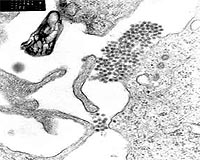| . |  |
. |
Manila (AFP) Oct 28, 2009 UN health experts began field investigations on Wednesday to help the Philippines contain an outbreak of a deadly disease in the wake of massive storms that claimed more than 1,000 lives, officials said. The World Health Organisation's four-member team will work with and advise local officials on combating leptospirosis, an infection caused by exposure to water contaminated with rat and other animal urine, the agency said. "They have already commenced field trips, looking at hospitals and taking in the situation there, including at evacuation centres," said Adam Craig, a spokesman for the WHO's Western Pacific regional office based in Manila. Parts of Manila and outlying areas remain flooded with stagnant water more than one month after tropical storm Ketsana dumped a record amount of rain on the nation's capital. Exactly one week after Ketsana, tropical storm Parma brought massive destruction further north on the main island of Luzon. The number of people who died as a direct result of both storms is 929, but a further 167 people have since died in and around Manila from leptospirosis, according to the government. Authorities have handed out millions of doses of antibiotics to contain the disease, but Craig warned the threat of it spreading would remained as long as the stagnant water remained. "People continue to live in water-logged areas and the risk is still there," Craig said. Officials have said the flood waters for more than a million residents on the outskirts of Manila may remain well into the new year. The WHO also said the situation had been worsened "by the fact that many hospitals and clinics are damaged or are still under water." It said in a statement that many hospital staff were unable to go back to work, because they too had been affected and marooned in evacuation centres. "The Philippine government has responded commendably to this disaster," said WHO regional director Shin Young-Soo, who is based in Manila. "But this is clearly a very difficult situation." The WHO said the health experts from Australia, France, the Netherlands and Singapore were drawn from the Global Outbreak Alert and Response Network, a pool of experts on permanent standby to respond to health emergencies. They are expected to remain in the Philippines for three weeks. Share This Article With Planet Earth
Related Links Epidemics on Earth - Bird Flu, HIV/AIDS, Ebola
 Weather helps predict dengue fever
Weather helps predict dengue feverGuangzhou, China (UPI) Oct 26, 2009 Chinese scientists say they've determined weather conditions such as temperatures, humidity and wind speed can help predict dengue fever outbreaks. Dengue fever -- one of the most widespread insect-borne diseases found in humans -- is a viral disease transmitted by mosquitoes in tropical and subtropical regions of the world. Being able to predict the trend of dengue fever can facilitate ... read more |
|
| The content herein, unless otherwise known to be public domain, are Copyright 1995-2009 - SpaceDaily. AFP and UPI Wire Stories are copyright Agence France-Presse and United Press International. ESA Portal Reports are copyright European Space Agency. All NASA sourced material is public domain. Additional copyrights may apply in whole or part to other bona fide parties. Advertising does not imply endorsement,agreement or approval of any opinions, statements or information provided by SpaceDaily on any Web page published or hosted by SpaceDaily. Privacy Statement |